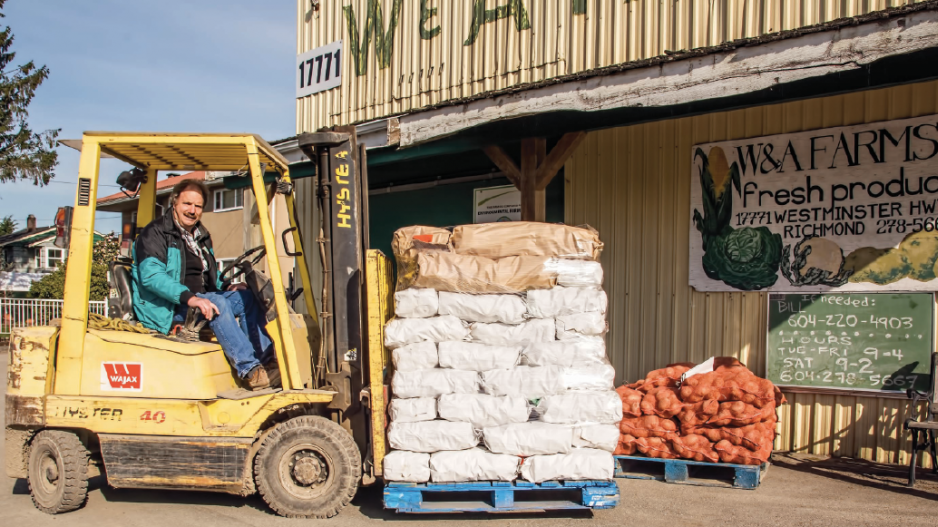Bill Zylmans is used to growing potatoes. The coronavirus crisis, however, has resulted in growing headaches for the owner of W&A Farms in Richmond.
“We had a two-week window there that ended about a week ago where we couldn’t find a truck if our life depended on it,” the lifelong farmer told Business in Vancouver April 7.
Zylmans said his go-to trucking companies had been enlisted by big grocers to make long hauls south of the border to restock depleted store shelves.
But as hoarding has eased off over the past few weeks, a sense of stability has returned to food transportation, he said.
“The public has settled down, and this impulse-buying and stockpiling has slowed down phenomenally.”
Zylmans added that his farm’s own on-site retail outlet selling meat and potatoes saw a significant spike in business.
“Supplies have increased, and we’ve settled down and we’re OK. But there’s still glitches along the way, and it’s not going to be a cakewalk.”
Labour is one issue facing B.C. farmers as they seek to meet demand for the upcoming planting and harvest seasons.
Temporary foreign workers (TFWs) will be allowed into Canada to help farmers amid unprecedented travel restrictions on non-citizens and non-residents brought on by the COVID-19 pandemic.
But employers will be required to isolate workers for 14 days after entry into the country or risk being prohibited from hiring TFWs.
Canada’s food security depends on assistance from 60,000 workers, who begin arriving in B.C. this week on flights chartered by industry and paid for by employers.
The restrictions put considerably more pressure on industry to adapt, according to BC Agricultural Council executive director Reg Ens.
In addition to bearing the expense of chartered flights, which Ens said cost as much as double commercial flights, farmers are required to upgrade the housing for migrant workers who will be in quarantines for two weeks before they can begin working.
Farmers will also be paying the workers who will be unable to work until their quarantine period passes. But for now, Ens said, the province’s food supply is not in jeopardy.
“There’s been some disruptions, we’ve seen some shortages here and there, but overall we have lots of food in B.C. It might take some tweaking of the supply chain to get it into the right distribution channels, but there’s no shortage of food.”
Problems may emerge in the long term due to uncertainty over market conditions brought on by the pandemic.
“Do I invest more money in this crop or do I wait this cycle out?” Ens said.
Farmers are now being encouraged to reach out to potential workers on local job boards as Canadians that otherwise would not have considered agricultural jobs suddenly find themselves out of work.
Meanwhile, trade across the two borders is continuing mostly unimpeded, according to Joy Nott, a partner at KPMG Canada’s trade and customs practice, and the former president of the Canadian Association of Importers and Exporters Inc.
“Nobody wants to stop the economy from ticking,” she said.
“We might have hiccups here or there, but I don’t think Canadians should be worried about food on the store shelves.”
She said a false sense of scarcity in the North American food supply chain has emerged as shoppers see barren shelves in many stores.
But manufacturers base their production on how much product is typically sold during any given week.
“They don’t want to manufacture too much and have inventory sitting in warehouses because that’s dead money. So they manufacture in this just-in-time environment,” Nott said.
“When you have … consumers [rushing] in to buy six months’ worth of toilet paper on one grocery-store shopping trip, they’ve disrupted the cycle. And now that that cycle has been disrupted, everyone is scrambling to refill the shelves.”
And availability of some products can get tricky if some businesses within a supply chain are forced to lock down or slow down due to labour constraints caused by the pandemic.
“The minute that you have some players in the supply chain who are either shut down or working at less than full capacity it starts to have a ripple effect all the way down the supply chain.”
Nott added that most Canadians don’t think about the fact that a calf can be born in Canada, shipped to the U.S. to be raised and shipped back to Canada to be slaughtered before being processed in the U.S. for meat in a frozen lasagne that eventually lands back in Canadian stores.
“As Canadians we shouldn’t be too worried, because our food supplies are more integrated with the U.S. than anybody else,” Nott said, noting that if Canadians were facing supply-chain issues then Americans would be as well.




